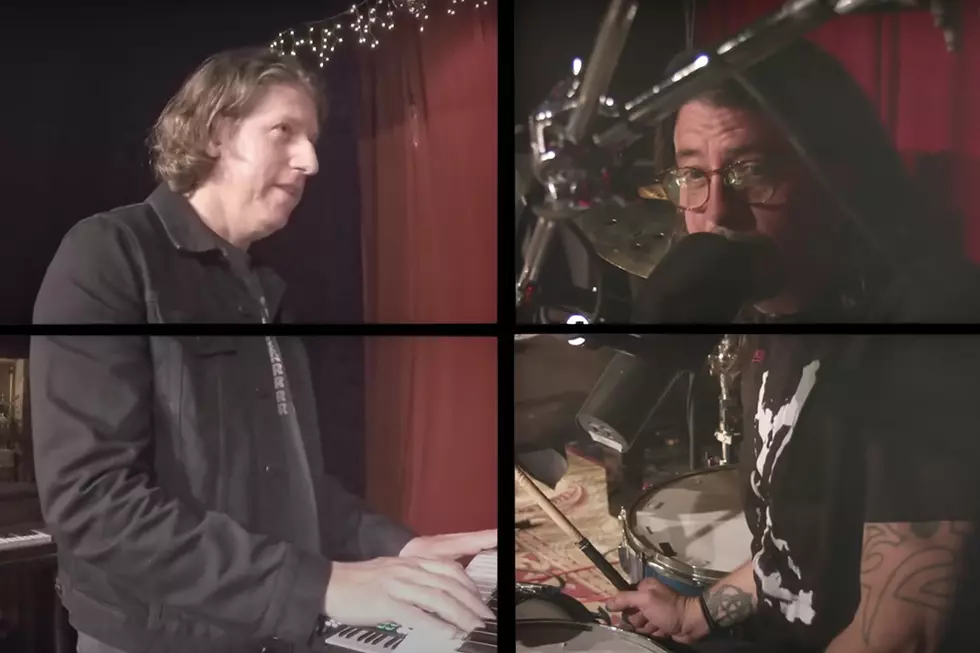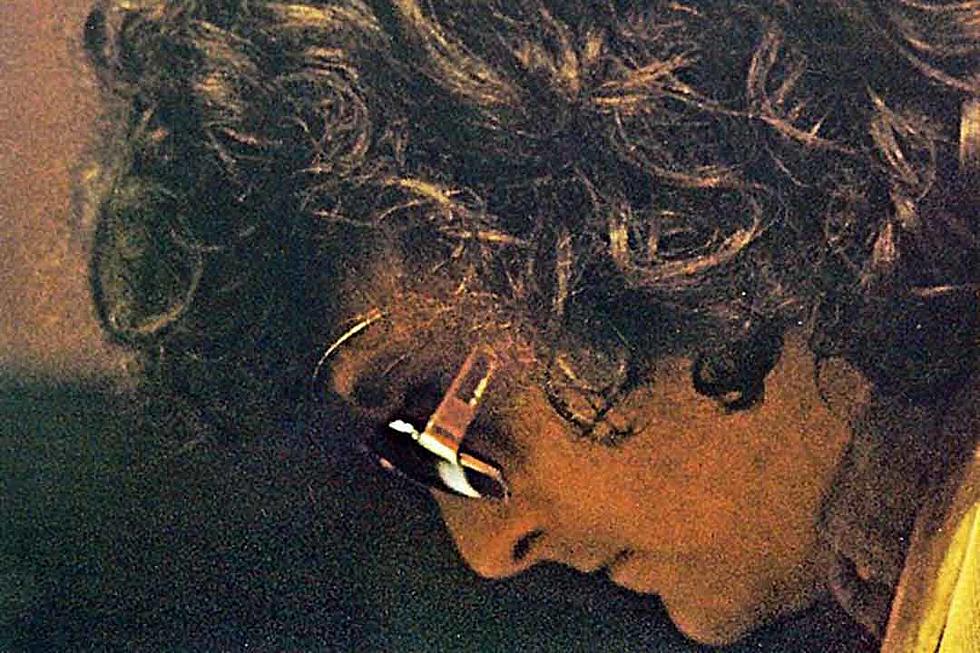
How Randy Newman Confounded Expectations With ‘Born Again’
After spending the early years of his career on the commercial margins, you'd think Randy Newman would have been jumping for joy after scoring the first hit of his career with the No. 2 single "Short People" in 1977. But as he'd soon learn, not all hits are created equal.
The song, a widely misinterpreted satire that imagines the viewpoint of a lunatic bigot who hates short people, caught on as a sort of novelty anthem – partly due to a political controversy ginned up by Maryland state representatives who tried to pass legislation making it illegal to broadcast. As had periodically been the case with Newman's music (and would continue to haunt him throughout subsequent efforts) many people missed the point, and the end result was an unexpected success that would prove difficult to build on.
"You'd rather have a hit. But 'Short People' was the worst kind of hit to have. If you can have a bad hit, that would be one of them," he explained during an interview with Pitchfork. "It was like 'Witch Doctor' by Alvin and the Chipmunks."
That wasn't necessarily the attitude, however, when Newman started work on his first album following the "Short People" breakout. Unlike previous efforts, Newman's sixth studio LP – eventually titled Born Again and released in August of 1979 – had the benefit of following a Top 10 predecessor. As he later recalled, it put him in an unusual position. After years of serving as one of Warner Bros.' low-selling prestige artists, he actually had commercial expectations to contend with.
"After I did Born Again, everyone was so confident about it, about how well it would do. It was like the Titanic. They paid me lots of money like it was going to be big, and it was the first album I myself thought was going to be a success, believe it or not," he admitted years later. "But I'm not going to have hits. I don't have the record, you can tell by now. I've written 150 songs and two have been hits – ‘Mama Told Me Not to Come' and ‘Short People.' I think it's mainly because of the lyrics, or the voice. It's hard to say."
There are countless reasons why any album flops or succeeds, but in the case of Born Again, Newman might have chosen more wisely with the cover art, which depicts him seated behind an executive desk, hair and face disguised by Kiss-like makeup that includes dollar signs over his eyes. It's distinctive, and for those who'd been following his work, it was a perfectly Newman gesture. Later, though, he wondered if it might have been a subconscious way of derailing his Top 40 career before it really got started.
"I think if I had more success it might have pressured me out of writing just whatever I wanted to write. I don't have that strong a character," he mused. "Born Again, just looking at the cover, seems like a reaction to that, presuming that people would know I'm not just some a–hole with makeup on. They'll know who I am. Which was a mistake – they don't know who I am. That's the weirdest album I ever made."
Listen to Randy Newman Perform 'They Just Got Married'
From a production standpoint, Born Again may have seemed a little weird to longtime fans, or anyone expecting more piano-driven pop in the vein of "Short People." As with much of the rest of his work over the ensuing decade, the record finds Newman utilizing synths to a far greater degree, and puts the songs under a sheen that doesn't really exist on his earlier LPs. But in terms of songwriting, "weirdest" is probably overstating things. As the album cover hinted, this is a collection of songs about human nature at its most comically venal and corrupt, which is to say it's thematically of a piece with the rest of his catalog.
One recurring theme, as expressed in the opening track "It's Money That I Love," is the rise of unabashed greed as a means to its own end. Well before Oliver Stone turned "greed is good" into a sarcastic mantra for the '80s in Wall Street and yuppies became an emblem for an increasingly possession-driven culture, Newman called attention to it the way he normally did – by writing a song from the deluded viewpoint of a person standing on the wrong side of a problem. "I think that money is tremendously important in the world," Newman explained during a 1979 interview with the NME.
"And more so than ever, money is making people mean. That's what I was writing about. I wasn't writing about myself per se. But I have played a few dates just for money, and they always turned out badly for some reason. But I am not ... indifferent to its charms, though I don't think it's of overriding importance to me. A lot of people say that and you don't know whether to believe them or not – and I don't know whether to believe myself."
Plenty of critics and listeners were just as confused after listening to Born Again, which combines some of Randy Newman's subtler songwriting with some of his darker lyrical excursions. A case in point was "Mr. Sheep," in which the narrator ruthlessly mocks a businessman on his way to work. As tends to be the case with Newman's music, the joke was actually on the guy trying to tell the joke, but plenty of people took the song at face value.
"I really concentrated on that album, Born Again, on acting with my voice. It was a really difficult record," he admitted in a 1982 interview with BAM. "People who love 'Sail Away,' those more comfortable liberal attitudes, found Born Again tough to deal with. It's the same, but harder to get at." Singling out "Mr. Sheep," he continued, "People say, 'How can you take such an easy shot at a businessman with a briefcase?' The clue was those haunting, terrible rock and roll Nazi voices taunting the guy. Maybe I didn't do it well. But I thought it was so obvious."
Listen to Randy Newman Perform 'Mr. Sheep'
As Born Again stalled on the charts at a disappointing No. 41, Newman confessed to a certain amount of frustration. "This record's doing this and that one's doing a regional breakout. It's run by those guys. Guys who don't know a B-flat from their a–hole," he lamented, surveying the charts shortly after the album was released. "I don't think it affected my writing in the slightest, but I thought maybe I'd sell a lot of records this time. It was on my mind. I'd like to be able to play any place in America and fill 8,000 seats. I still think Born Again is the best record I've ever made, though I feel defensive about it in some ways because people think I got mean. They want me to be an acoustic fellow and do "Sail Away" for ever and ever."
The sad irony there is that Newman didn't get mean at all. In fact, by trusting his audience to get the joke, he was making a show of faith in human nature that his critics rarely gave him credit for. Part of the problem, as he saw it, was that people took rock lyrics at face value far too often in general. "It’s artifice," he laughed in a 1998 interview with Mojo. "It’s like when you meet an actor, it’s always a disappointment. This little guy is Tom Cruise?! There haven’t been five tough musicians in history, and they’re doing all this posturing and sneering and snarling. And that’s fine, that’s what you do. 'Street Fighting Man,' 'Under My Thumb.' I mean, how long would it take you to get out from under Mick Jagger’s thumb?"
Even considering the novelty of "Short People" and the occasional joke going over listeners' heads, Randy Newman still seemed poised for continued mainstream success when Born Again was released, but if anything, it had the opposite effect – stalling his commercial rise and cementing his reputation as a critics' darling who was destined never to break through the gold and platinum barrier. In the years immediately following its release, he turned to film work, scoring Milos Forman's 1981 movie Ragtime and slowly composing a musical adaptation of Faust that would eventually see release in 1995.
In the meantime, he seemed somewhat vexed by Born Again."How much do I really like this record?" Newman asked during a 1982 conversation with BAM. "‘Spies’ could have been better musically. ‘They Just Got Married’ I like, ‘Santa Cruz’ is good. ‘Pretty Boy’ I like. ... I think with a lot of these songs, I must have been listening to a lot of radio. ... ‘Half a Man’ was my favorite, about homosexuality being contagious. I like that music in the bridge where the guy 'catches it.'"
Occasionally, he seemed to understand that he'd obscured his message a little too deliberately, as with the album-closing "Pants," which mainly consists of Newman threatening to disrobe. "'Pants' is about these big heavy pretentious rock 'n' roll acts like Kansas or Styx. I saw some big rock shows, in a baseball arena, which I'd never seen before, and I couldn't believe what an impersonal thing it was," he mused. "This kind of false sexual innuendo, you know, 'I'm gonna take off my pants!' -- the whole thing was a drag, and really demeaning to the audience. Who wants to put these ... these ... anybody on a pedestal like that?"
Listen to Randy Newman Perform 'Half a Man'
When it came to "The Story of a Rock and Roll Band," which tells a warped version of the Electric Light Orchestra origin story over a heavily ELO-inspired arrangement, he even found himself accused of insulting his peers. "What I like about it is that I got everything so wrong," he laughed. "Mispronounced the name of the town, made up their names. And they do have these idiosyncrasies about their music that are funny. It's maybe a kind of a joke, but I wouldn't have done it if I really hated them like I hate some people."
Ultimately, Randy Newman accepted responsibility for the album's middling performance, partially chalking it up to a failure of imagination. "It'll ruin me if I can't write seriously within the form any more, and I didn't for a long time. But it's tough for me to like the music sometimes," Newman mused in a 1983 interview. "I sort of wrote myself into a dead end [on 'Born Again'] by taking nothing seriously."
As the '80s wore into the '90s, Newman focused more and more on film work, resurfacing sporadically to issue studio albums that were unfailingly greeted with positive reviews even as fans who pined for the sonic warmth of his '70s output found themselves kept at arm's length by the increasingly glossy production of efforts such as Trouble in Paradise (1983) and Land of Dreams (1988). "I'm dissatisfied with a million things," he later admitted. "I just worked with Don Henley and Paul Simon separately. Simon was trying to get rid of his acoustic guitar, which was always beautiful to me, and Henley was trying to bury his voice, which is also fine. I'm beginning to think it's endemic to musicians to not like what you do best. Like me, I hate the way I play piano and sing."
But even as he's faded into the background as a recording artist over the last couple of decades, releasing fewer albums but receiving far more attention for his work on films like Pixar's Toy Story series, Newman has maintained a steady presence on the road – and like any Rock and Roll Hall of Fame inductee, he understands that whatever career misfortunes he may have suffered, he must be doing something right.
"I've always thought, 'Oh, this could be a hit.’ I was just always wrong," he told OffBeat in 1998. "I've never predicated what I was going to do on having a hit necessarily, but I think about it. I think, ‘What the hell am I making this record for?’ Especially If I don’t have a good time making it. The other thing is, there are people who really like everything I do, so it’s sort of for them, too."
The Very Best Albums From More Than 100 Classic Rock Acts
More From Ultimate Classic Rock









